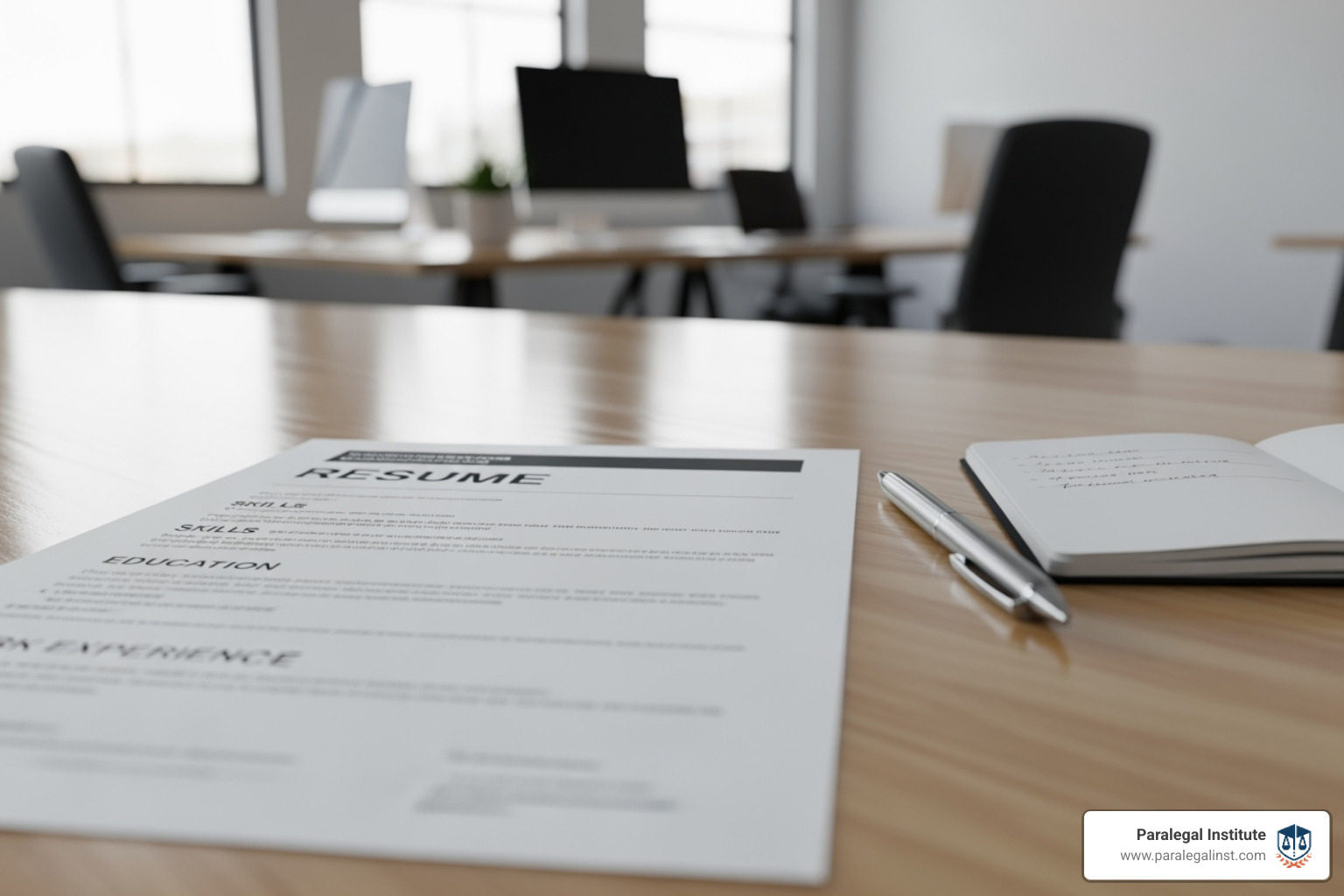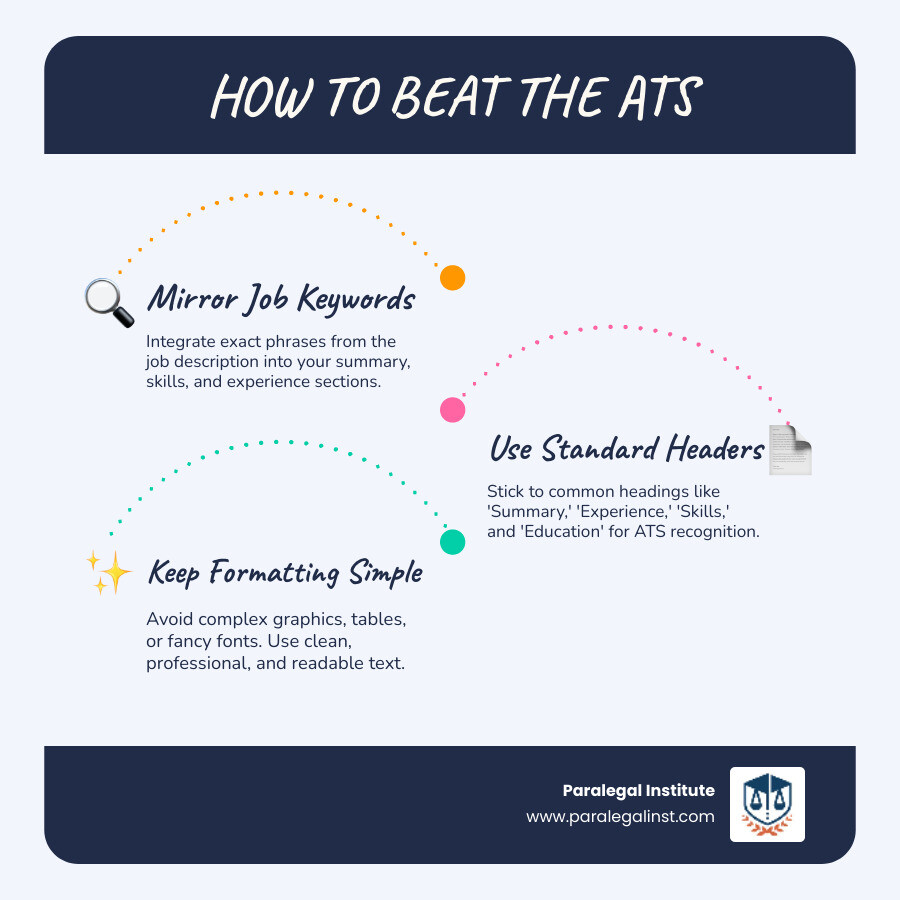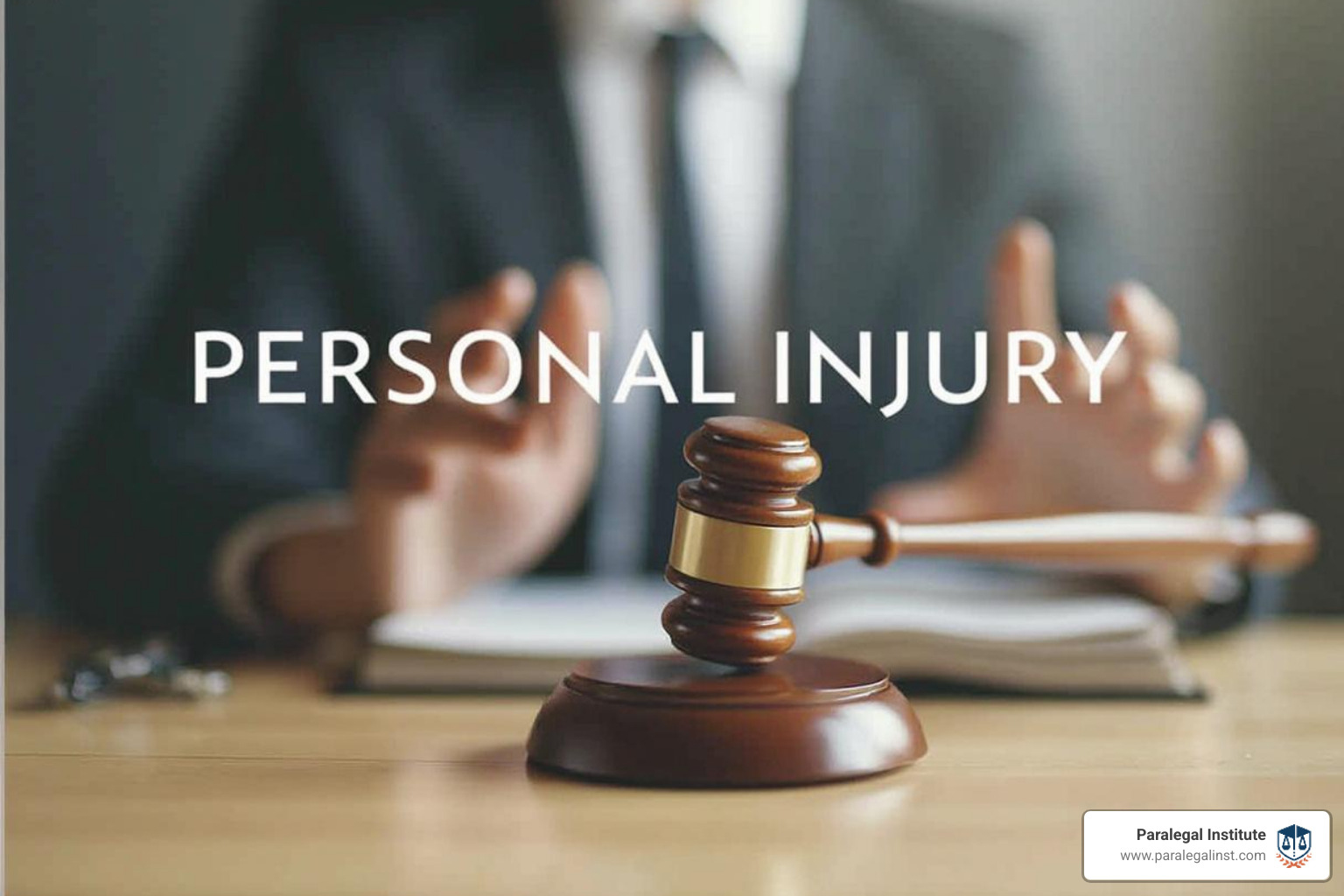Personal Injury Paralegal Resume Samples to Steal (Ethically, of Course!)
Why Your Personal Injury Paralegal Resume Matters
If you're searching for personal injury paralegal resume examples, you're in the right place. A strong resume highlights your skills and experience, helping you get noticed by law firms. The key elements of a successful resume include:
- Impactful Summary/Objective: A short statement showing your value and career goals.
- Quantifiable Experience: Use numbers and results to show your achievements.
- Relevant Skills: List both your legal expertise and soft skills.
- Custom Content: Match your resume to each job description for Applicant Tracking Systems (ATS).
Paralegals are crucial to a law firm's success, especially in personal injury law, where you work closely with clients during difficult times. With the Bureau of Labor Statistics forecasting strong job growth for paralegals , it's a great career path. This guide will help you craft a resume that opens doors.
As Matthew Pfau, I've spent years hiring and training paralegals for my law firm, giving me insight into what makes a resume stand out. This experience inspired me to develop the Paralegal Institute curriculum to train aspiring legal professionals.
Winning Personal Injury Paralegal Resume Examples
We know you're eager to see what a job-winning resume looks like. This section provides concrete examples to guide you, focusing on how to tailor content to your experience level and frame your skills and accomplishments.
The Entry-Level Personal Injury Paralegal Resume Example
Starting your career in personal injury law is exciting, and your resume should reflect that enthusiasm and potential. Even with no direct experience, you can create a powerful resume that highlights your readiness for the role.

For an entry-level resume, focus on a strong objective statement. This 2-3 sentence paragraph should state your career goals and how you'll contribute to the firm. Highlight your paralegal certificate to show employers you've completed a dedicated program, like our 15-week course at the Paralegal Institute, which provides hands-on skills for immediate workforce entry.
If you lack direct legal experience, emphasize transferable skills. Past administrative or customer service roles are highly relevant. Did you manage schedules, communicate with clients, or organize documents? These skills are vital for a paralegal. Showcasing your eagerness to learn and a strong work ethic can also make a significant impact, as law firms seek dedicated individuals ready to contribute.
If you're curious to learn more about what to expect in an entry-level role, we have more on what to expect in an entry-level role. And for those looking for practical strategies to land their first legal job, check out our tips for landing your first paralegal job.
The Experienced Personal Injury Paralegal Resume Example
If you've been in the trenches of personal injury law, your resume should showcase your impact and expertise.
For an experienced paralegal, a powerful professional summary is key. This 2-3 sentence statement at the top should encapsulate your years of experience, key strengths, and significant achievements.
The core of your resume lies in quantifying achievements. Don't just say you "managed cases"; instead, state that you "Managed a caseload of 100+ active personal injury cases." Instead of "assisted with settlements," try "Aided in negotiating settlements totaling over $1 million." Using numbers provides concrete evidence of your value.
Highlight your expertise in case management, from intake through settlement or trial preparation. Detail your experience drafting legal documents, reviewing medical records, and preparing for depositions. Proficiency with legal software like Westlaw, LexisNexis, and Clio is also crucial.
To understand the vital role of experienced paralegals, we encourage you to read more on the topic.
The Career-Changer Personal Injury Paralegal Resume Example
Transitioning into personal injury law from another field requires a strategic approach to your resume. You have valuable skills; we'll show you how to highlight them.

For a career-changer, we recommend a hybrid resume format. This combines a chronological work history with a functional emphasis on your skills. Start with a robust "Skills" section that lists your most relevant abilities.
Highlight transferable legal skills. If you have experience in other legal areas like litigation or insurance, you understand court procedures, claims, and negotiations. These experiences are incredibly valuable. Focus on common threads like legal research, writing, document drafting, case management, and client relations. Empathetic communication is paramount in personal injury law.
Our program at the Paralegal Institute provides practical, transferable skills, making it an excellent pathway for career changers. Showcasing your paralegal certificate alongside your transferable skills demonstrates your readiness and adaptability.
To learn more about how to successfully get a paralegal job, even if you're making a career switch, we have a comprehensive guide for you.
The Anatomy of a Perfect Personal Injury Paralegal Resume
A great resume is more than a list of jobs; it's a strategic document designed to impress hiring managers and pass screening software. Let's explore the essential sections that make a personal injury paralegal resume example shine.
Contact Information & Professional Header
Your header is the first thing a recruiter sees, so make it clear and professional. Include your:
- Full Name
- Professional Email Address(e.g., firstname.lastname@email.com)
- Phone Number
- LinkedIn Profile URL
- City and State(e.g., Las Vegas, NV)
The Compelling Summary or Objective
This is your elevator pitch, placed at the top to grab attention.
- Experienced professionals(3+ years) should use a professional summary. This 2-3 sentence paragraph highlights your top skills, years of experience, and key qualifications. Example: "Dynamic Personal Injury Paralegal with 7+ years of experience, adept at managing complex caseloads from intake to settlement and proficient in LexisNexis and Clio."
- Entry-level or career-changing professionals should use an objective statement. This focuses on your career goals and how your skills will benefit the firm. Example: "Motivated Paralegal Institute graduate seeking to apply hands-on legal research and document drafting skills in an entry-level Personal Injury Paralegal position."
Tailor this section with keywords from the job description for maximum impact.
The Experience Section: Show, Don't Just Tell
List your jobs in reverse-chronological order(most recent first). Use 3-6 bullet points for each role to make it easy to scan.
The key is to quantify your achievements. Instead of listing duties, show your results with numbers. For example, instead of "Managed client files," write "Managed a caseload of 50+ personal injury files, ensuring accurate documentation and timely follow-up." This provides concrete evidence of your effectiveness.
Start each bullet point with a strong action verb to make your contributions sound more impactful. Here are some powerful verbs for your resume:
- Analyzed
- Assisted
- Coordinated
- Drafted
- E-filed
- Expedited
- Facilitated
- Investigated
- Managed
- Negotiated
- Organized
- Prepared
- Processed
- Researched
- Reviewed
- Supported
- Trained
- Used
- Verified
Education & Certificates: Your Foundation
This section confirms your foundational knowledge and dedication to the legal field. List your formal legal training clearly.
Include the Name of the Institution, the Program Completed(e.g., Paralegal Certificate), and the Completion Date. You can also briefly mention the practical skills gained, such as legal research, document drafting, and litigation support. Our 15-week program at the Paralegal Institute is designed to give you these real-world skills, showing employers your commitment and readiness for the role.
Must-Have Skills for Your Personal Injury Paralegal Resume
Personal injury law requires a unique blend of technical legal knowledge and interpersonal finesse. Your personal injury paralegal resume examples must showcase your proficiency in both the legal heavy lifting and the human touch.
Essential Hard Skills
These are the practical, hands-on abilities that show you can get the job done. Hiring managers want to see that you can hit the ground running with these vital skills.
Key hard skills include legal research using tools like Westlaw and LexisNexis, proficiency with case management software like Clio or MyCase, and experience with medical record review. You'll also need to be adept at demand letter drafting, e-filing procedures, and discovery and litigation support. Other crucial skills are client intake, document preparation(pleadings, motions), settlement negotiations, and managing court filings.
To give you a clear picture, here's a quick look at the essential hard and soft skills:
| Hard Skills | Soft Skills |
|---|---|
| Legal Research (Westlaw, LexisNexis) | Empathy and Compassion |
| Case Management Software (Clio, MyCase) | Client Communication |
| Medical Record Review | Strong Organizational Skills |
| Demand Letter Drafting | Attention to Detail |
| E-filing Procedures | Time Management |
| Discovery & Litigation Support | Problem-Solving |
| Client Intake | Teamwork and Collaboration |
| Document Preparation (pleadings, motions) | Adaptability |
| Settlement Negotiations | Analytical Thinking |
| Court Filings | Client Service |
Crucial Soft Skills
While hard skills show what you can do , soft skills show how you do it. In personal injury law, where clients are often going through tough times, these are just as valuable as legal knowledge.
Empathy and compassion are essential when dealing with clients who are hurt or scared. This ties into clear and kind client communication. Behind the scenes, strong organizational skills and attention to detail are non-negotiable for managing multiple cases and deadlines. You'll also need excellent time management and problem-solving abilities to steer the legal world. Finally, teamwork and collaboration are vital, as you'll work closely with attorneys and other staff. Adaptability, analytical thinking, and top-notch client service will also set you apart.
Tailoring Your Resume and Avoiding Common Pitfalls
Creating a strong resume is the first step; ensuring it gets seen is the next. This section will teach you how to customize your resume for each application and avoid common mistakes that could send it to the "no" pile.
Beating the Applicant Tracking System (ATS)
Many law firms use Applicant Tracking Systems (ATS) to scan resumes before a human sees them. If your resume isn't optimized for this system, it might never reach a hiring manager. Here's how to pass this digital test:

- Mirror Keywords: Carefully review the job description and weave the same key terms, skills, and qualifications into your resume.
- Use Standard Headers: Use common headings like "Professional Summary," "Experience," "Skills," and "Education" that the software can recognize.
- Keep Formatting Simple: Avoid complex graphics, tables, or unusual fonts that can confuse the ATS. Stick to standard fonts like Arial or Calibri.
- Submit as a PDF: Unless instructed otherwise, submit your resume as a PDF to preserve your formatting.
Common Mistakes That Get Your Resume Tossed
Even qualified candidates make simple mistakes that get their resumes discarded. Avoid these common pitfalls:

- Typos and Grammatical Errors: In the legal field, precision is paramount. A single typo can be a major red flag. Proofread multiple times and ask someone else to review it.
- A Generic Resume: Recruiters can spot a one-size-fits-all resume. Always tailor your resume to the specific job description.
- Vague Descriptions: Quantify your achievements with numbers. Instead of "Assisted attorneys," say "Managed a caseload of 50+ personal injury files."
- An Unprofessional Email Address: Use a simple, professional email address that includes your name.
- Forgetting to Proofread: This is critical. Spell-checkers don't catch everything, so a thorough human review is essential.
Frequently Asked Questions about Personal Injury Paralegal Resumes
Crafting the perfect resume can feel like a puzzle. Here are answers to some of the most common inquiries we receive.
How do I write one of the best personal injury paralegal resume examples with no direct experience?
You can craft a strong resume even without direct experience by focusing on what you do have.
- Use a strong objective statement to state your career goals and show your eagerness to contribute.
- Highlight your Paralegal Certificate. Completing a program like our 15-week Paralegal Institute certificate shows you have foundational knowledge and practical skills.
- Emphasize transferable skills. Skills from customer service (client communication) or administrative roles (organization) are highly valuable.
- Include volunteer work or internships. Practical experience, even unpaid, can set you apart. Gaining experience through paralegal internship opportunities is a great way to build your resume.
- Build a professional portfolio. During your training, keep samples of your best work (e.g., legal memos, research briefs) to show employers your practical skills. Learn more about building a professional portfolio during your training.
How long should my personal injury paralegal resume be?
For most paralegals, especially those with less than 10 years of experience, a one-page resume is best. It forces you to be concise and highlight your most relevant achievements for busy recruiters. A two-page resume is only acceptable for senior-level paralegals with extensive, directly relevant experience and a long list of significant, quantifiable achievements.
Should I include a cover letter with my resume?
Yes, absolutely. A cover letter is a crucial part of your application. It's your chance to:
- Tell a story: Explain why you're interested in that specific firm and role.
- Connect with the hiring manager: Addressing it to a specific person shows you've done your research.
- Demonstrate your writing skills: This is essential for a paralegal.
- Highlight your passion: Show your genuine interest in personal injury law.
While your resume lists qualifications, your cover letter makes a personal connection and persuades the hiring manager to consider your application.
Conclusion
Crafting a powerful personal injury paralegal resume example is your ticket to securing interviews and landing your dream role. Remember to create a resume that is custom for each job, quantified with achievements, and completely error-free.
By following the tips we've shared, you can create a document that highlights your unique value, passes through Applicant Tracking Systems (ATS), and catches the eye of hiring managers.
If you're looking to build a strong foundation with practical, real-world skills, an accelerated program like the one at the Paralegal Institute can help. Our hands-on training is designed to equip you with the confidence and know-how to launch your career.
We're here to help you succeed. To learn more about how we can support your career goals, find out more about our legal support staff training.











